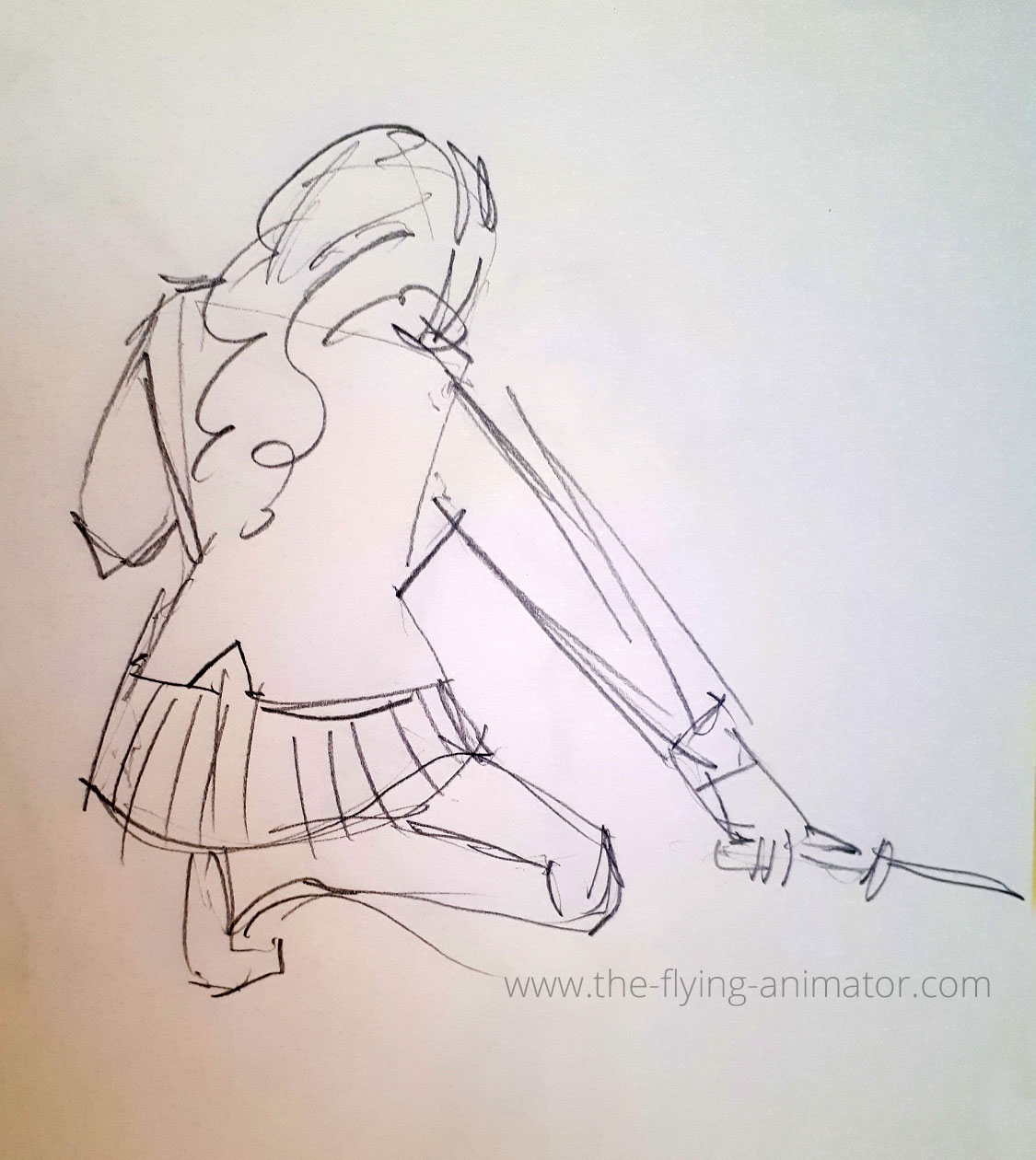Learn To Draw People
To learn to draw people, you need to find people to draw.
As an animator, people DOING THINGS is what you really need. So:
Find a nice bench in the park and sit there with your sketchbook and pencil.
A shopping Mall is great too, if the weather is bad.
Start by just looking for a while.
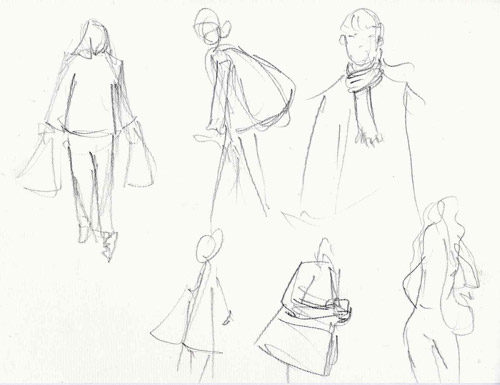
Every place you choose will have different kinds of people, doing different kinds of things.
For example, at the entrance to the supermarket I saw people:
- Carrying heavy shopping bags
- Waiting, with their loads, for friends and spouses
- Standing around, leaning on things, talking on their cellphones
- For animators, this is pure gold.
- You want to learn to draw people who are moving around, not just a stationary model at the studio.
Finding a Model to Draw
When you sit there, looking, see if you can find recurring actions. Look for postures that repeat themselves, items that show up again and again.
Let's see the supermarket again:
See how people lean over to one side when carrying a heavy bag?
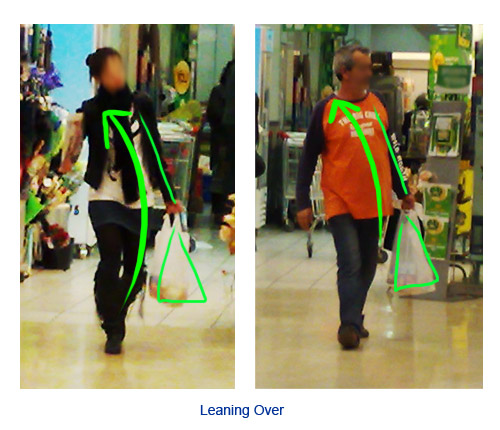
See how people who carry two loads on each side hold their arms out in an arc to avoid hitting their shins?
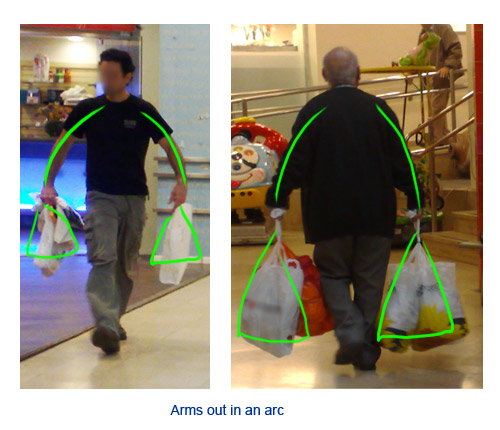
Notice also that most people carry a backpack or purse or briefcase as well as their shopping. Perhaps they hold a child by the hand as well.
These are the sort of things you need to look for.
Now you might ask - how can I learn to draw people when they walk by in such a hurry?
Well - because they are all doing the same thing, repeating the same actions over and over again, you can "catch" the repetition.
Instead of having one model who stands still, you have many models, all repeating the same action.
This you CAN draw.
Now you can put your pencil to the paper.
start with one guy, and when he walks away, just wait for the next one to continue.
This is good exercise for learning to draw strong keyframes. The action you are most likely to "catch" is the strong extreme position.
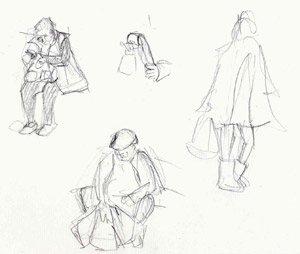
Detail Drawing
If you are interested in the fine details, such as hands and bags or clothes, then take out your camera. A cellphone camera will do nicely too.
Take some snap shots while you draw.
You can analyze these later, in the comfort of your studio, and draw from the pictures.
On site, look for people who sit or stand for a bit.
Concentrate on drawing one detail at a time, you probably won't have more than a minute or two. Draw just the bag, or just the hairstyle with out the face.
Taking Mental Snapshots
Try this: look around for something interesting.
Say a guy walked by with a huge and very heavy bag.
How do you know it's really heavy? Because he leans very strongly to the other side in order to balance himself. Now instead of looking down to the paper and missing all the action, don't draw yet - just look.
Look really hard and try to memorize the strongest lines that describe the action.
When the guy has gone - sketch him from memory. Just the important things that interested you.
Practice these mental snapshots to build yourself a mental image library.
Practical Advice For Drawing Outdoors
Most people won't mind you drawing them, might not even notice. Some will notice, and they will usually be embarrassed and pleased. Be nice to the ones that come up to you to have a look and tell you how talented you are. If they ask you what you are doing - just say the truth: You are learning to draw people. Who knows, they might even buy a drawing.
But some people might not like it.
Long years of experience have taught me to be careful when drawing:
- Ultra-religious persons, severely dressed
- Pretty girls with BIG BOYFRIENDS
- Children who are not mine
- Homeless or Drunks or other people who might become violent at the prospect of being stared at.
Do be careful.
Drawing from real life is the best way to learn how to draw people, but don't offend others while you do it.
With this in mind, here are some ideas for places to find people to draw:
- Shopping malls
- Side-walk cafe's and Diners
- Parks and Boulevards
- City squares and plazas
- The beach (see Big Boyfriend warning)
- At the office
- At home - draw your family and friends - if they agree
- Sporting events of all kinds
You might want to invite some friends to come with you. Drawing in a group is nicer than being alone. It also calms down your potential subjects, because it makes the Artist-Model situation less personal.
A good drawing session could last two or three hours. (4 or 5 if you really get into it.)
Apart from your sketchbook you might want to take several pencils, sharpener, eraser and other media, and also:
- Something to eat
- A water bottle
- Something to sit on
- Coat and or good hat.
Please don't litter!
For the Out-door drawing class I teach in Tel-Aviv I bring a large thermos of hot tea, as it gets rather cold in the winter evenings.
Drawing with friends is fun, especially when drawing outside. It's nice to have company, and probably a bit safer too.
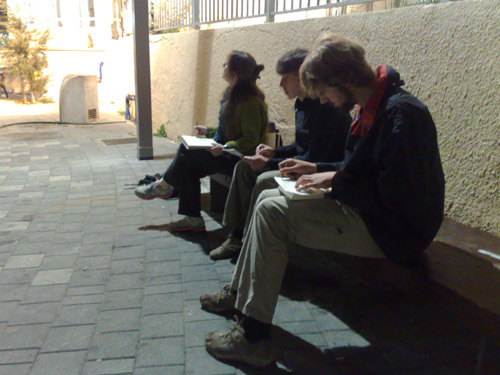
Your turn now!
How to draw perspective with a single vanishing point?
Home > Learning to Draw > How to draw people
Figure Drawing Journal:
In This Section
Basics:
More Drawing Tuts:
anatomy- the movement of the spine
drawing perspective with a single vanishing point

